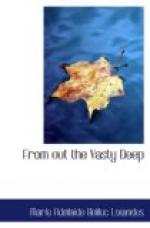The programme was carried out to the letter. They all drank a cup of tea standing in the hall when dressed ready for their expedition. Everyone was happy, everyone was in a good humour—excepting, perhaps, Bill Donnington. The few words Bubbles had said concerning Mr. Tapster had frightened, as well as angered him. He watched the unattractive millionaire with jealous eyes. It was only too clear that Bubbles had fascinated James Tapster, as she generally did all dull and unimaginative people. But Donnington, perforce, had to keep his jealous feelings to himself; and after they had all reached the school-room of the pretty, picturesque little village, he found he had far too much to do in helping to serve the hungry children and their parents with the feast provided for them, to have time for private feelings of fear, jealousy and pain.
A small platform had been erected across one end of the room. But the programme of the proceedings which were to take place thereon only contained two items. The first of these took most of the Wyndfell Hall house-party completely by surprise; for Bubbles and her aunt had kept their secret well.
Tables had been pushed aside, benches put end to end; the whole audience, with Lionel Varick’s guests in front, were seated, when suddenly there leapt on to the platform the strangest and most fantastic-looking little figure imaginable!
For a moment no one, except Bill Donnington, guessed who or what the figure was. There came a great clapping of hands and stamping of feet—for, of course, it was Bubbles! Bubbles dressed up as a witch—red cloak, high peaked hat, short multi-coloured skirt, high boots and broom-stick—all complete!
When the applause had died down, she recited a quaint little poem of her own composition, wishing all there present the best of luck in the coming year. And then she executed a kind of fantastic pas seul, skimming hither and thither across the tiny stage.
Everyone watched her breathlessly: Donnington with mingled admiration, love, and jealous disapproval; James Tapster with a feeling that perhaps the time had come for him to allow himself to be “caught” at last; Helen Brabazon with wide-eyed, kindly envy of the other girl’s cleverness; Varick with a queer feeling of growing suspicion and dislike.
Finally, Bubbles waved her broom-stick, and more than one of those present imagined that they saw the light, airy-looking little figure flying across the hall, and so out of a window—.
The whole performance did not last five minutes, and yet few of those who were present ever forgot it. It was so strange, so uncanny, so vivid. Bill Donnington heard one of the village women behind him say: “There now! Did you ever see the like? She was the sort they burnt in the old days, and I don’t wonder, either.”
After this exciting performance the appearance of “the squire,” as some of the village people were already beginning to call him, did not produce, perhaps, quite the sensation it might have done had he been the first instead of the second item on the programme. But as he stood there, a fine figure of a man, his keen, good-looking face lit up with a very agreeable expression of kindliness and of good-will, a wave of appreciation seemed to surge towards him from the body of the hall.




